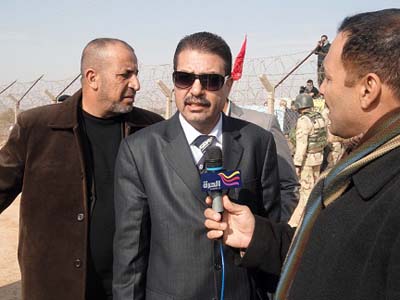 |
| Iraqi official: Stop bargaining and start thinking of a place for your Mojahedin Khalq |
Head of Iran-Iraq Friendship Committee in Iraq’s Northern Salahuddin province Nafeh Eissa underlined his country’s determination to expel the anti-Iran terrorist Mojahedin-e Khalq Organization (MKO) from Iraq’s soil.
"Europeans should rest assured that expulsion of MKO from Iraq is definite. Therefore, they should stop bargaining and start thinking of a place to shelter the members of the terrorist group instead," Eissa told the official website of the Habilian association, a human rights group formed of the family members and relatives of the Iranian victims of terrorism.
He further pointed to a protest gathering held outside MKO’s camp in Diyala on Friday, and noted, "People of Iraq have been demanding their expulsion from the country since long time ago."
On Friday, a group of Iraqi people gathered outside the MKO’s main training camp in Iraq, and called for the expulsion of the terrorist group from the country’s soil.
The demonstrators gather outside the Camp of New Iraq (formerly known as Camp Ashraf) in Iraq’s northern province of Diyala on Friday and demanded that the terrorist group be removed from their country.
The Baghdad government has assured the Iraqi people that it is determined to expel the MKO from Iraq by the end of 2011.
Meantime, media report said that the US is trying to convince Iraqi officials to relocate MKO members within Iraq.
Under the US plan, the approximately 3,400 residents of Camp Ashraf would be temporarily relocated within Iraq, farther from the border with Iran, a US State Department official announced.
The relocation would be temporary, the official said, with final settlement of the inhabitants in other countries.
That would not include the United States, the official said, "since US law bars anyone associated with a terrorist organization from settling there".
Since the beginning of this year, the Baghdad government has repeatedly assured Iranian officials and people that it is determined to expel the MKO from Iraq by the end of 2011.
"Expulsion of the MKO from Iraq’s soil and termination of its presence which has lasted for several years is a definite decision," Iraqi Government Spokesman Ali Al-Dabbaq told FNA in April, adding, "The MKO will be expelled from Iraq by the end of the current year."
"The only option for the members of the MKO is leaving Iraq and they have no other choice," he reiterated.
Reminding to the black record of the terrorist group and its crimes against the Iraqi people, Dabbaq said, "Collaboration with the former Iraqi dictator and massacre of thousands of our people is just part of their crimes".
Baghdad had earlier this month announced that members of the terrorist group must leave Iraq’s soil by the end of 2011.
Dabbaq announced in early April that the cabinet is determined to shut down Camp Ashraf located North of the capital, Baghdad, and disband the terrorist group.
"The council of ministers has committed to implement an earlier decision about disbanding the terrorist group by the end of this year at the latest, and the necessity of getting it out of Iraq," the official noted.
The MKO, whose main stronghold is in Iraq, is blacklisted by much of the international community, including the United States.
Before an overture by the EU, the MKO was on the European Union’s list of terrorist organizations subject to an EU-wide assets freeze. Yet, the MKO puppet leader, Maryam Rajavi, who has residency in France, regularly visited Brussels and despite the ban enjoyed full freedom in Europe.
The MKO is behind a slew of assassinations and bombings inside Iran, a number of EU parliamentarians said in a recent letter in which they slammed a British court decision to remove the MKO from the British terror list. The EU officials also added that the group has no public support within Iran because of their role in helping Saddam Hussein in the Iraqi imposed war on Iran (1980-1988).
The group started assassination of the citizens and officials after the revolution in a bid to take control of the newly established Islamic Republic. It killed several of Iran’s new leaders in the early years after the revolution, including the then President, Mohammad Ali Rajayee, Prime Minister, Mohammad Javad Bahonar and the Judiciary Chief, Mohammad Hossein Beheshti who were killed in bomb attacks by MKO members in 1981.
The group fled to Iraq in 1986, where it was protected by Saddam Hussein and where it helped the Iraqi dictator suppress Shiite and Kurd uprisings in the country.
The terrorist group joined Saddam’s army during the Iraqi imposed war on Iran (1980-1988) and helped Saddam and killed thousands of Iranian civilians and soldiers during the US-backed Iraqi imposed war on Iran.
Since the 2003 US invasion of Iraq, the group, which now adheres to a pro-free-market philosophy, has been strongly backed by neo-conservatives in the United States, who also argue for the MKO to be taken off the US terror list.

